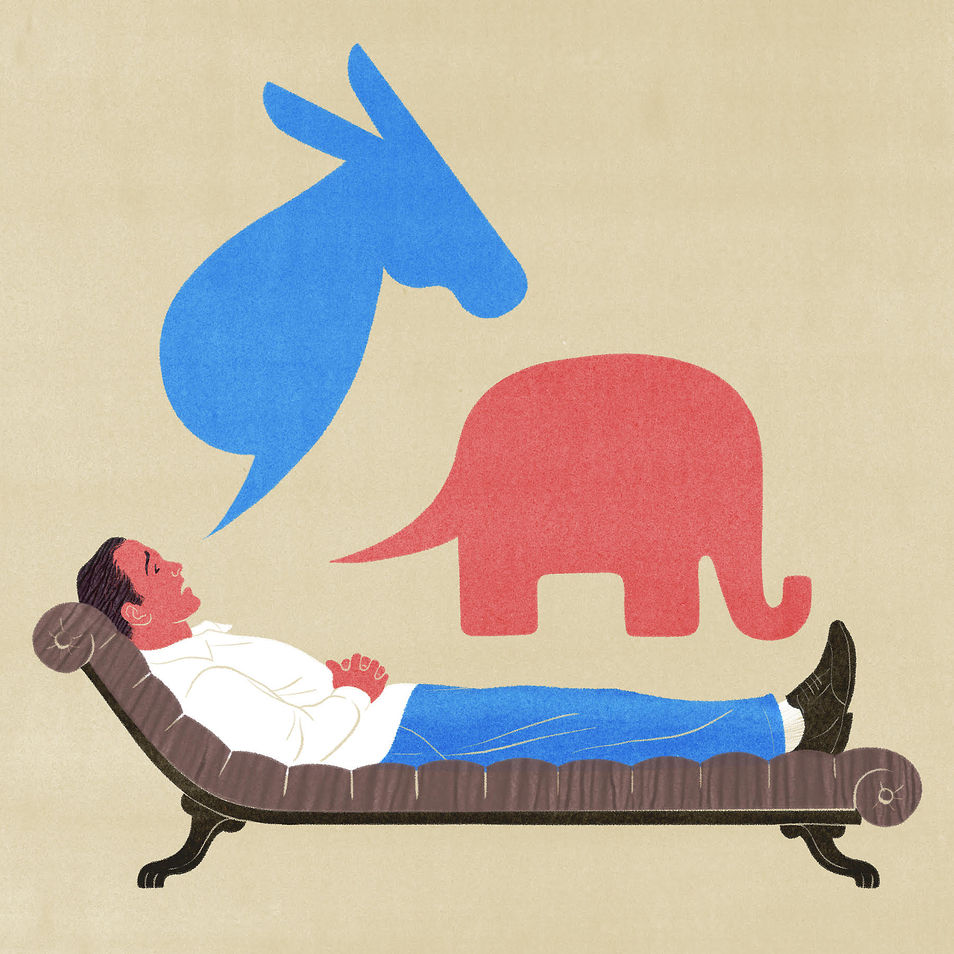The Journal of Clinical Psychology recently published a piece on how therapists’ self-disclosure of political preference and perceived shared values with patients impacted the therapeutic alliance. They found that 87% of therapists said they discussed politics during sessions, 63% reported political self-disclosure and those who perceived political similarity with patients were more likely to have political discussions, self-disclosure, and a higher self-rated therapeutic alliance. At the time of the study, Clinton-supporting therapists reported their clients showing increased political discussion and negative emotions following the 2016 presidential election, with the opposite for Trump supporters.
“The results of our study suggest that therapists’ political views have a significant effect on their work with their patients,” wrote the researchers. “Our findings call for greater recognition of the potential impact of the sociopolitical context on in‐session therapeutic process and relationship. These findings suggest that as others have recently argued, the political discourse is an important aspect of clinical work.”

Recent research posits that the 2016 presidential election has had detrimental effects on the psychological well-being of youth and adults. This study is the first to investigate how Trump’s tenure has impacted the therapeutic relationship from the therapists’ point of view.
A 2018 study from the same authors showed that two-thirds of patients reported political engagement with therapists, half of the patients wanted to speak about politics more frequently and that two-thirds of patients reported their therapist disclosed their political views either implicitly or explicitly. Moreover, patients reported a better therapeutic alliance when they perceived their therapist as sharing their political views. There is, however, limited work on the effects of politics on the process of psychotherapy.
Previous studies have shown that political differences between therapists and patients negatively impacts therapists’ empathy to their patients. Others suggest that therapists report better outcomes for patients who show a change of values in line with their therapists’ values.
From back in the time of Freud, therapists have been told to avoid the dangers of self-disclosure, though significant shifts in this line of thinking have occurred recently, with studies reporting self-disclosure as a means to create a genuine connection to clients, as well as increasing therapist warmth and liking.
The current study aimed to understand therapists’ perspectives on how the current political climate has impacted therapy and patients’ and therapists’ experiences.
“[W]e predicted that at least two‐thirds of therapists will report political self‐disclosure, and that such disclosures would contribute to a stronger therapist‐reported alliance,” wrote the authors. “We also predicted that… therapists who perceive political similarity with their patients and experienced their in‐session political discussions as helpful would perceive their therapeutic alliance with their patients as stronger.”
“Finally, we hypothesized that… therapists who self‐identify as Hillary Clinton supporters would report a preelection/postelection increase in political discussions with their patients, whereas therapists supporting Donald Trump will not report such increase. Additionally, as patients who self‐identified as Clinton (but not Trump) supporters in our first study reported increased negative and decreased positive emotions expressed in session toward the Trump administration, we predicted therapists will report similar trends about their patients’ emotions during psychotherapy sessions.”
The authors solicited therapist responses to an online survey through listservs, websites, social media, community clinics, and by scouring Psychology Today. The authors aimed to recruit a diverse background of therapists and ultimately collected 268 verified responses. Of these 268, 62% self‐identified as Democrat, 7% as Republican, 23% as Independent, 4% as other, 3% indicated no political preference and 1% did not respond.
Therapists answered questions about the therapeutic alliance, their and their clients’ political orientation, political self-disclosure, the similarity of their political views to their clients, clients’ emotional expression before and after the election and on whether a number of political topics, such as distrust of the government, were discussed in their sessions.
Results showed that 87% of therapists reported having spoken to clients about politics in the last three weeks, that they spoke with about 44% of clients about politics, and that they agreed with 58% of their clients’ political views. Those who believed their clients shared their political orientation were more likely to discuss politics in-session and reported stronger therapeutic alliances.
Therapists who reported explicit disclosure of political stance, as compared to those who did not disclose and those who implicitly revealed, reported the highest levels of the therapeutic alliance. In-session political agreements had a mostly (69%) positive effect, while disagreements had a mostly neutral (68%) or negative (18%) effect.
“Therapists who indicated they voted for Clinton reported significant pre-post increases in political discussions in all the topics investigated in the study,” report the authors.
“In contrast, no significant differences were found for therapists who reportedly voted for Trump… Specifically, this group reported increased discussions on distrust of journalists and the media, policies that affect women, and social and health benefits. They also reported observing a decrease in their discussions with patients about the following topics: distrust of the government; education policies; immigration policies; environmental policies; foreign policies; government regulations; tax, military, and defense policies; and controversies regarding police behaviors.”
The authors conclude that, despite traditional views suggesting self-disclosure can be harmful, therapists who reported explicit disclosure of political views and who saw such discussions as positive had higher reported levels of the therapeutic alliance. Future studies, the authors suggest, should investigate therapists’ and patients’ perceived quality of the therapeutic alliance and political attitudes, examining whether divergence in the quality of alliance is related to the divergence of political views.
The study is limited by its small number of Trump-supporting therapists (9% of the sample), despite efforts to recruit in Republican-leaning counties. Additionally, the sample has a high degree of ethnical homogeneity (89% white), which is in line with the underrepresentation of people of color in psychology. Further, data were collected at only a single time point, which doesn’t allow for longitudinal analysis; this could be improved in future studies.
“[M]any therapists may be deeply affected by the current political climate, and thus may need support and guidance from peers and supervisors in navigating the complexities of political discussions and self‐disclosure in the therapeutic space,” the authors conclude.
“[W]e encourage psychotherapy researchers to consider the potential effects of the sociopolitical area on reports collected from therapists and patients in both controlled experimental and naturalistic settings.”
****
Solomonov, N., & Barber, J. P., (2019). Conducting psychotherapy in the Trump era: Therapists’ perspectives on political self‐disclosure, the therapeutic alliance, and politics in the therapy room. Journal of Clinical Psychology, [Epub ahead of print]. (Link)















Not sure if that was the intention, but the picture of the donkey rear-ending the elephant made me chuckle. I’m quite sure they take turns, though.
Report comment
The “mental health” workers tend to lean so far left that they force treated Kayne West, right after the 2016 election, seemingly for being an outspoken Trump supporter.
https://www.nytimes.com/2016/11/21/arts/music/kanye-west-hospitalized-exhaustion.html
But also because Kayne, and lots of Trump supporting youtubers and reddit readers, were discussing our society’s pedophilia, rape, and child trafficking run amok problems online. Activities with which Hillary’s associates, and perhaps even Hillary, may be involved.
http://ibankcoin.com/zeropointnow/2016/11/26/sick-lets-revisit-the-podesta-penchant-for-pedophilic-cannibalistic-and-satanic-art/#sthash.XmQphtec.Qq0arcnb.dpbs
http://americasmiachildren.com/the-clintons-and-child-trafficking-in-haiti/
https://www.youtube.com/watch?v=31LHO8WMPmw
Information about which went viral on the internet during and after the 2016 election, resulting in the #MeToo and other “# movements.” These societal problems are now even being discussed by world leaders, and the ethical few within the “mental health” community.
https://www.nytimes.com/2018/04/11/us/backpage-sex-trafficking.html
https://globalfreedommovement.org/putin-blasts-euro-western-culture-of-pedophilia-and-satanism/
https://www.amazon.com/Pedophilia-Empire-11-Book-Series/dp/B077N6WNQS
But the majority of our “mental health” workers don’t want anyone ever discussing concerns of child abuse, trust me I know, I tried. The psychiatrists actually believe the way to help a child abuse survivor, who had largely healed from abuse that had occurred four years prior, according to medical records, was to drug him. Eek! Bye! But I eventually learned this is probably because covering up child abuse is, and has been, the number one actual societal function of both the psychologists and psychiatrists, for over a hundred years.
https://www.indybay.org/newsitems/2019/01/23/18820633.php?fbclid=IwAR2-cgZPcEvbz7yFqMuUwneIuaqGleGiOzackY4N2sPeVXolwmEga5iKxdo
https://www.madinamerica.com/2016/04/heal-for-life/
And today’s problem regarding this is due to a design “flaw” in the DSM. Today NO mental health worker can EVER bill ANY insurance company for EVER helping ANY child abuse survivor EVER, unless they first misdiagnose the child abuse survivors with the billable DMS disorders.
https://www.psychologytoday.com/us/blog/your-child-does-not-have-bipolar-disorder/201402/dsm-5-and-child-neglect-and-abuse-1
I do understand that discussing the reality that child abuse happens is a difficult and taboo topic, but if we don’t discuss our society’s real problems, we can’t fix those problems. And a society that has a multibillion dollar group of scientific fraud based, primarily child abuse covering up, “mental health” industries – who aid, abet, and empower the child molesters, while poisoning the victims on a massive societal scale – does end up with systemic, societal pedophilia and child sex trafficking run amok problems.
Perhaps the “mental health” workers should get out of the business of profiteering off of covering up child abuse, and we should start arresting and convicting the child abusers instead? But it does make sense that those who profiteer off of covering up child abuse, would want child abusers in charge of our country. And having child abusers in our government apparently has been a problem with our country for a long, long time. And it’s a societal problem that exists within both the Republican and Democrat parties.
Report comment
Well, people shouldn’t be asked to believe that the issues of concern to them are someone divorced from politics. They shouldn’t even be in the therapist’s office. They should be out on the barricades, fighting shoulder to shoulder with comrades.
Report comment
I haven’t seen any barricades around here lately, PM.
Report comment
“Laugh about it, shout about it; when it’s time to choose
any way you look at it you lose.” — Paul Simon
Report comment
Politicians,their secretaries and psychiatrists,together are the ones who decides the fate of the psychiatry patients.Journalists too are involved if they do not publish accurate information about psychiatric conditions.They can very well mislead the people by printing that can only be considered myths.I have frequently come across articles which puts the blame on the patients,as if there is no problem with the chemical theories of psychiatry or the lack of a proper mental health care system.
Politicians are never concerned about providing psycho-social support to the patients.They have been somehow convinced by the psychiatrists and pharma lobby that drugs are all that is required.And these health ministers have not an iota of idea of what psychiatric conditions mean.They really are ignorant about what they are dealing with.
If a psychiatry patient is burnt by black magicians or at an illegal treatment center,killed or commits suicide,here in our country,neither the psychiatrist nor the health ministry is held responsible.The patient’s family does not get any compensation either,which is readily made available within seconds for other category of patients.Contrary to this if someone gets infected with a viral fever,the threat of the ruling party’s downfall looms large.Questions are posed through the media,facebook,twitter,newspapers as to why the govt was unable to contain this “self limiting”viral fever!Whether it is the leftist,rightist,center,forward,backward,all political parties are equally ignorant about psychiatry and do not want to do anything worthwhile for the patients.
That is the reason why India spends only 0.006% of it’s GDP for psychiatry.And most of this fund goes towards paying salaries and for other administrative related work.It is not meant to be spent on the patients.And whatever amount is left behind for the patients,the psychiatrists do not spend it for mental health activities because they do not have the will power or the fund gets misdirected towards some other sector.Finally at the end of the financial year that fund gets lapsed.It cannot be carried over to the next financial year.That’s how our bureaucracy works.
Report comment